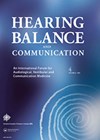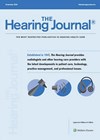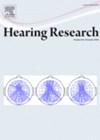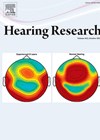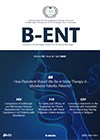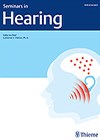
Journal Reviews
Falls and ASL users
A mixed-method pilot study was carried out to assess the cognitive load of sign language among users and, consequently, the possible risk of injurious falls. The study specifically investigated the possible risk of falls due to the simultaneous activity of...
Are they just ignoring you?
The clarity of hearing in background noise, which is influenced by the signal-to-noise ratio, has been a much-debated topic over many years from various angles. This study looks at anaesthetised cats and, as cats are not commonly known for their...
Person-centric practice within a hearing wellbeing programme
This Australian team describe their development process of a hearing wellbeing programme beginning in August 2020, with a wide variety of stakeholders being involved. Primarily, they report, they aimed to overcome the challenge of providing engaging social and emotional support...
Case study suggesting mtDNA mutation as a tinnitus factor: ND1:m.3394T>C
Konadath et al report a genetic case study of a 24-year-old female experiencing reduced hearing sensitivity and tinnitus along with a blocked sensation in her right ear, sudden onset one year prior with no other otological complaints. Standard audiometry along...
Sound levels in our daily public places
Hearing conservation and noise safety are significant public health issues globally. Drinkwater’s article describes a wide variety of initiatives which contribute to healthier sound levels in public spaces and daily environments. One of particular interest is hearing assistive technology (HAT)...
Audiological decision-making in a complex bimodal case of adult congenital atresia
The authors describe a clinical case of a 65-year-old man with left congenital atresia who, as an adult, developed hearing loss in his right (better) ear and subsequently began seeking audiological intervention for hearing difficulties. Their client’s unique case history...
Tinnitus without hearing loss – inflammation?
Inflammation can have a profound impact on multiple systems. Certainly in recent years, autoimmune conditions are on the rise and the impact on audiovestibular symptoms have been documented. Given the rates in the population, the impact of inflammation on the...
Where is it?
Humans’ ability to process sound is a multi-faceted phenomenon. It is a marvel which likely changes through our ageing process and is influenced by a myriad of factors. This paper examines the particulars of the dimensions of sound processing –...
Systemic steroids for sensorineural hearing loss
This Japanese retrospective study looked at whether the dosage of prednisolone affects the response rate in patients with idiopathic sudden sensorineural hearing loss. The authors included a total of 159 patients over a 14-year period who were treated with 200mg/day...
Not to be underestimated
Equipment may differ, formulas and hearing aids alter, but I am in agreement with what this article points out: the test box can be considered a vastly under-used and under-appreciated piece of equipment. It can provide an alternative verification for...
Are we now safe at work?
Fifty years is a long time, yet the years pass in a blink of an eye. Where are we in comparison to where we were then, in terms of the occupational protection from noise exposure and ototoxicity, other than being...
All present and correct
You have ear protection, but are you using it properly? What are the risks over time? The design of standard earplugs has changed a lot in a decade. Earplug attenuation did reduce over time but still remained safe, however the...

